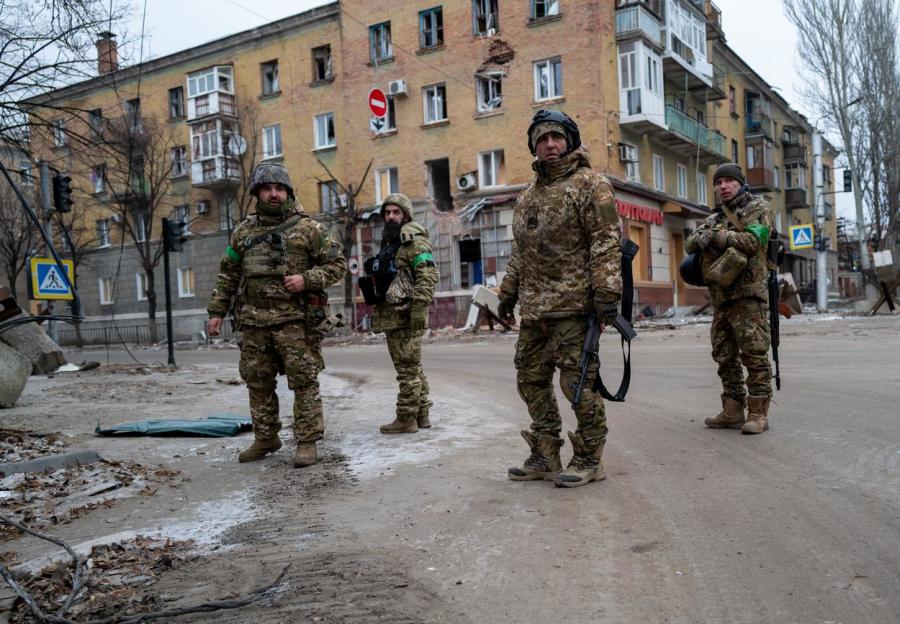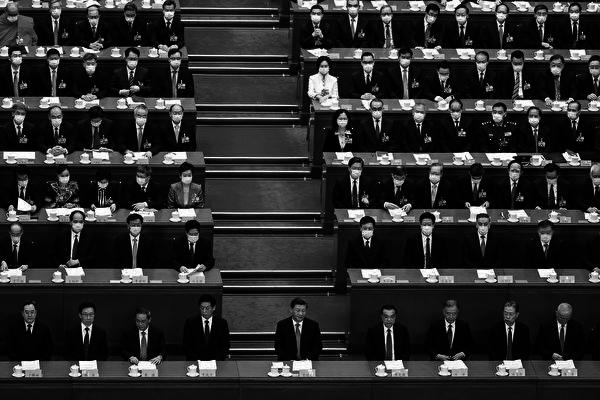A Ukrainian soldier walks through the heavily damaged city of Bakhmut, which became one of the fiercest battlefields in the nearly year-long war between Ukraine and Russia as of January 13, 2023. (Photo by Spencer Platt/Getty Images)
[People News] In April of this year, after Ukraine captured two Chinese citizens who were fighting alongside Russian troops, Ukrainian President Volodymyr Zelensky revealed on social media that Ukraine had confirmed the recruitment of over 150 Chinese citizens by Russia to participate in the conflict. The 'Frankfurter Allgemeine Zeitung' has obtained the list of 155 Chinese mercenaries mentioned by Zelensky and interviewed one former mercenary who has since returned to China.
According to a report by Radio France Internationale, citing the 'Frankfurter Allgemeine Zeitung', the Chinese man is named Tu Haolei (音译), who voluntarily went to Russia to serve as a mercenary.
Tu Haolei explained that during the pandemic, his auto repair shop was ordered to shut down. However, he needed to pay his mortgage. The two years were financially challenging, and he frequently argued with his wife. Then, he came across an advertisement on Douyin that piqued his interest: join the Russian army as a soldier, with a monthly salary equivalent to 20,000 RMB. He still has this advertisement saved on his phone, which was translated from Russian to Chinese using translation software.
Tu Haolei successfully obtained a Russian tourist visa, and upon arriving in Moscow, he approached the police station to request contact with the conscription office. Subsequently, he fought alongside the Russian invading forces as a mercenary for a year.
Tu Haolei served in the Chinese Communist Party's Armed Police Force for several years, receiving two months of training from Russian forces. Shortly thereafter, he was deployed to the front lines, where he was assigned to the 254th Motorised Infantry Regiment of the 144th Motorized Infantry Division within the 20th Guards Army. Six months later, he was reassigned to the main assault unit.
"The Russians are very brave. Sometimes I even think they are a bit foolish: they could have waited for the bombing to stop before launching their attack," Tu remarked. He observed many soldiers who were over fifty, some even over sixty, and noted that some had squinting eyes, limps, or chronic illnesses. "Such a situation would be impossible in China."
Tu described the conditions for the mercenaries as dire. One Kazakhstani mercenary, frustrated by the ongoing lack of water, confronted his commander with a gun, only to be shot dead by the commander without hesitation.
He also pointed out that communication between the mercenaries and the Russian army was hampered by language barriers. When the actual attack commenced, everyone resorted to using very simple phrases: "Advance," "Hold the position," "Two on the left," "Two on the right."
"Once we entered enemy territory, retreat was not an option," he recalled from a battle where he had to step over the bodies of more than thirty of his comrades.
On one occasion, an enemy drone trapped him in a thicket of thorns, forcing him to lie on the ground from 1 PM to 9 PM. During that time, he reflected deeply, saying, "I felt I should die on May 30, 2024." His only injury was a loss of hearing in his right ear.
After his contract ended, he was reluctant to return to the battlefield, stating, "As long as I am alive, I am satisfied." Upon returning to his home country, Tu Haolei found himself still unemployed.
Tu Haolei stated that after returning to China, he was summoned by the Chinese Communist Party police and national security departments over ten times. "They mainly focused on my motivations for participating in the war and whether I had any connections with foreign armed forces or organisations." All the data on his mobile phone was copied, including his bank records and call logs, which were examined by the national security department. Ultimately, they found no issues.
Investigators also later inquired about his war experiences "privately." The Chinese side is particularly interested in how Russia responds to Western weapons and tactics. It is understood that Moscow is very reluctant to share these experiences with Beijing.
Although Tu Haolei has been back in China for several months since returning from the front lines in eastern Ukraine, the memories of the war still haunt him. "I had several close friends with whom I spent more than half a year. One of them, named Vaja, from Moscow, was shot in the head and died; his eyeball exploded right in front of me. That was the first time I witnessed such a bloody scene."
Tu Haolei expressed deep regret for joining that war. Why did he join Russia? He stated that he found Zelensky "disgusting and extremely hypocritical." He also harbours resentment towards Japan, having read about Japan's support for Ukraine. Ultimately, he mentioned his own economic difficulties.
Tu Haolei's final conclusion is that, for him personally, being a mercenary is not worth it. With the continuous devaluation of the ruble, his monthly salary of 20,000 yuan is also diminishing. He believes that even if Russia ultimately wins, it will be a costly victory.
Beijing does not view Russia's invasion of Ukraine as illegal. China also does not have laws that explicitly prohibit its citizens from serving as mercenaries for Russia.
Following President Zelensky's public remarks about Chinese mercenaries in April this year, the Chinese Ministry of Foreign Affairs issued a response, labelling these comments as 'baseless accusations' and 'political manipulation.' The ministry further emphasised that the Chinese government 'consistently calls on citizens to avoid areas of armed conflict and to steer clear of any involvement in such conflicts.' △











News magazine bootstrap themes!
I like this themes, fast loading and look profesional
Thank you Carlos!
You're welcome!
Please support me with give positive rating!
Yes Sure!